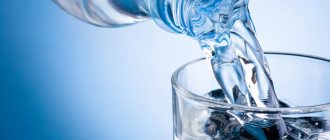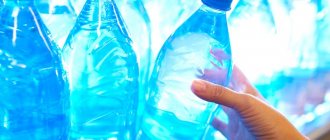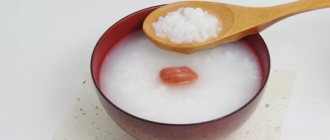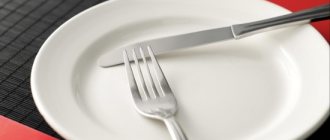Causes
If stool appears like water in an adult, the causes of the malaise are first determined and only after that treatment is prescribed. Gastroenterologists identify several factors that provoke intestinal ailments, in which water diarrhea occurs.
The most common causes of watery diarrhea are:
- Consumption of expired or low-quality products, leading to acute poisoning.
- Functional diseases of the gastrointestinal tract, in which food is not absorbed in the required volume.
- The cause of acute watery diarrhea is cholera and other infectious diseases (dysentery, salmonellosis).
- Taking large amounts of fast-acting laxatives for constipation.
- Tumors, polyps, which cause inflammation of the mucous membrane. They provoke diarrhea in the morning, often of a chronic nature.
- Allergy and intolerance to a certain product (for example, lactase deficiency, which can lead to increased gas formation, nausea, diarrhea).
- Toxic damage to the body from medications, volatile substances, and poisons can also cause severe water diarrhea in an adult.
- Violation of diet, consumption of monotonous foods. The illness may be painless, but cause inconvenience due to the need for frequent visits to the toilet.
- Helminthiasis. With large-scale infection, the patient may experience water diarrhea and nausea.
In older people, the main cause of diarrhea is often a deterioration in the absorption of nutrients in the gastrointestinal tract. Therefore, patients develop chronic loose, watery stools, which requires strict nutritional correction.
If you are sure that you only ate fresh food, most likely the causes of diarrhea lie in nervous overload. Stress can provoke watery diarrhea, which goes away only after the source of nervous shock is eliminated.
Water diarrhea in an adult: 6 possible causes, review of remedies
› Diarrhea and vomiting ›
Diarrhea with water is medically called secretory diarrhea. This symptom indicates a malfunction of the small intestine. The causes of illness can be both infectious and non-infectious in nature.
Causes of severe diarrhea with water in an adult
When water diarrhea occurs in an adult: the reasons are the first thing to find out. The main mechanism for the development of secretory diarrhea is a disruption of the absorption of fluid and electrolytes in the small intestine. Moreover, by liquid we should understand not only the water that comes with food, but also digestive enzymes - and about 7 liters of them are produced during the day.
The small intestine absorbs most of the moisture - up to 80%. The remainder reaches the large intestine, where it participates in the formation of feces. If the liquid bypasses the small intestine, or too much of it enters, diarrhea forms instead of stool of normal consistency.
Secretory diarrhea, or watery diarrhea in an adult without pain, can be caused by:
- Infectious diseases - cholera, yersiniosis, food toxic infections.
- Acute poisoning - including intoxication with arsenic, organophosphorus substances, insecticides.
- Specific hormone-producing tumors - mastocytoma, gastrinoma, VIPoma.
- Hereditary diseases - sodium diarrhea, chloridorrhea.
- Reaction to certain medications - for example, castor oil or strong laxatives (phenolphthalein, hay).
- Pathologies leading to impaired absorption of fatty and bile acids - for example, Crohn's disease.
If the stool has a yellow or green tint, this indicates a malabsorption of bile acids. This symptom is characteristic of chronic diseases of the digestive tract, and is also non-infectious in nature. In other cases, it is difficult to determine the cause of the malaise by the color of liquid stool - tests are needed.
Causes of watery diarrhea in a child
Water diarrhea in a child is caused by the following reasons:
- Intestinal infections of bacterial or viral etiology. Accompanied by nausea, vomiting, severe weakness, fever, and other symptoms of general intoxication. They quickly lead to dehydration and therefore require immediate treatment.
- Dysbacteriosis is an imbalance of intestinal microflora. It develops as a result of a long-term illness, poor nutrition, and taking antibiotics. with dysbacteriosis, watery diarrhea alternates with constipation. The stool has a greenish tint, has a specific sour odor and the presence of foam.
- Poor nutrition. Both the consumption of certain foods (for example, raw vegetables and fruits in large quantities) and banal overeating can lead to severe bowel upset in a child. The cause of the malaise may be individual intolerance to honey, cow's milk, cereals or other allergens.
- Severe stress - experienced fright, fear, excessive excitement. They cause a short-term stool disorder that goes away on its own after a few days.
- Acute respiratory diseases. When cold symptoms and watery diarrhea are combined, it is important to differentiate ARVI itself from enteroviral infections. To eliminate the symptom, the underlying disease must be treated.
In this case, calling emergency services is mandatory.
Treatment methods: review of effective remedies
When an adult has severe water diarrhea, what should you do? Until the cause of the illness is identified, you can take enterosorbents - Smecta, Polysorb, Enterosgel or their analogues.
They will help bind toxic substances that cause inflammation of the small intestine, as well as excess enzymes, and remove them from the body. In addition, some sorbents envelop the mucous membrane of the digestive tract, protecting it from irritation.
In this case, it is better to give preference not to tablets, but to gel-like products.
A mandatory measure for diarrhea with water is to replenish moisture reserves in the body. You need to drink a lot of fluid.
Regardless of the cause of secretory diarrhea, water-salt pharmaceutical solutions (Regidron, Humana Electrolyte) and clean water are useful.
If the presence of enteritis (an inflammatory process in the small intestine) is established, the patient is recommended to drink warm chamomile tea, rosehip decoction, and compotes.
Further therapy requires an accurate diagnosis and medical participation. In general, if an adult has water diarrhea, treatment includes the following methods:
- When identifying the bacterial nature of the underlying disease, use antibiotics. The following drugs are often used: Intetrix, Furazolidone, Enterol.
- If an allergy to a certain food is detected, exclude it from the diet and use antihistamines. The most effective are the third generation drugs - Levocyterizine, Desloratadine, Fexofenadine. They do not cause drowsiness, do not affect coordination of movements and the ability to drive a vehicle.
- If diarrhea is caused by poisoning, gastric lavage is mandatory. In a hospital setting, it is performed using a probe; at home, vomiting is artificially stimulated. Further therapy helps normalize digestion and eliminate the effects of intoxication.
- To eliminate painful abdominal cramps, antispasmodics are used - No-shpa, Drotaverine, Papaverine. Before the doctor arrives, they can be taken once, after the diagnosis is made - as prescribed.
- To restore healthy intestinal microflora, the patient is prescribed pre- and probiotics. The most famous are Bifidumbacterin, Baktisubtil, Hilak-forte.
- Antidiarrheal drugs are prescribed if the symptom is caused by a chronic gastrointestinal disease. Imodium, Loperamide, Enterobene are used. They slow down peristalsis and increase the tone of the anal sphincter, which helps stop diarrhea.
Therapy for diarrhea with water should be aimed at eliminating the main cause of the ailment. Therefore, it cannot be said that any particular remedy is most effective for all cases of secretory diarrhea.
If diarrhea with water is caused by a bacterial infection, treatment should suppress the activity of pathogenic microorganisms, so the patient is prescribed antibiotics.
If diarrhea with water is caused by rotavirus or poisoning, antibiotic therapy only worsens the situation.
Alternative home treatments
If water diarrhea occurs in an adult, treatment at home can combine methods of traditional and traditional medicine. The attending physician must be notified that herbal medicine will be used: despite its natural composition, it also has a number of contraindications and side effects.
Most often, when treating diarrhea with water, decoctions of the following medicinal herbs are used:
- yarrow;
- plantain;
- sage;
- eucalyptus;
- St. John's wort;
- burnets;
- nettle;
- sequences;
- lingonberries;
- lemon balm.
They are used both independently and as part of collections. The general rule is to drink the healing decoction warm and fresh. Each time you need to prepare a small portion of the medicine.
Therapeutic diet: how to properly create a diet
The peculiarity of secretory diarrhea is that during fasting it does not go away - only the volume of bowel movements decreases slightly. Therefore, the patient must eat properly and nutritiously, observing the following principles:
- All foods that can cause an allergic reaction are excluded from the diet.
- Products that cause chemical or mechanical irritation of the digestive tract are prohibited. These include coarse grains, sour fruits, berries, spices, and hot sauces.
- In order not to provoke the activation of pathogenic microflora, the consumption of desserts, confectionery, and whole milk is limited.
- To avoid dyspeptic symptoms (bloating, heartburn, flatulence), do not drink sweet carbonated drinks, fatty meats, fish, and legumes.
Boiled and baked vegetables, as well as steamed dishes, are healthy. Meat can be present in the diet, but only lean meat - chicken, turkey, rabbit. Lactic acid products - kefir, acidophilus, yogurt, cottage cheese will accelerate the normalization of intestinal microflora and eliminate dysbiosis.
For infants, breast milk is enough to restore digestion. Meals should be frequent, but in small portions. Lactose-free formulas are recommended for bottle-fed babies. For children one year old and older, it is useful to give kefir, acidophilus milk, and cook porridge based on vegetable decoctions.
Water diarrhea in an adult: 6 possible causes, review of remedies Link to main publication
Source: https://otravamnet.ru/diareya-rvota/ponos-vodoj.html
Symptoms

If bowel dysfunction occurs, symptoms that accompany diarrhea should be carefully noted. This allows you to quickly make a diagnosis and choose the right treatment. Possible signs of indigestion:
- The consistency of the stool may be completely liquid in case of poisoning. Additional symptoms: headache, weakness. Stomach pain is common. The patient is concerned about nausea, vomiting, and sweating.
- Food poisoning and dysbacteriosis usually occur without fever. But instead of feces, patients secrete liquid mixed with pieces of undigested food.
- If loose stool in an adult is caused by an infection or bacterial infection, the body temperature may rise to 37.5-38°C.
- With rotavirus, the patient’s stool changes not only the consistency, but also the color of the stool – to green. The stool becomes like water, the urge to defecate becomes more frequent.
- Diarrhea in the form of water can be foamy, interspersed with fat in functional intestinal disorders.
- With allergies and food intolerances, patients' stomachs rage and diarrhea becomes very runny.
- If there is blood in the stool or tar-colored stool in an adult, this may indicate internal bleeding.
The main danger posed by watery diarrhea is the loss of a significant amount of fluid. Since water in the intestines is not absorbed, dehydration of the body rapidly increases, the cells of the brain and heart muscle do not receive the necessary nutrition.
The following are signs of dehydration:
- Drying of the mucous membranes: dullness of the whites, feeling of dryness on the lips.
- Constant feeling of thirst.
- Headache, fatigue.
- Increased heart rate, cardiac arrhythmia.
- Reducing the volume of urine excreted, up to complete cessation of urination.
When a person has a stomach ache and water diarrhea is repeated frequently over a short period of time, a diagnosis should be made as quickly as possible and rehydration of the body should begin.
Disorders accompanied by watery diarrhea
Normally, stool consists of about 70% water. Everything else is mucus, enzymes and other components. In most cases, water during bowel movements is a violation indicating damage to the mucous membrane of the intestinal tract. Another equally common root cause is the presence of a large number of pathogens.
Watery diarrhea is usually accompanied by an excessively frequent urge to defecate. The patient may experience additional symptoms. The main causes of pathological changes in stool are described in the table.
| Dyspeptic deviation | It is a consequence of disruption of the production and regulation of the gastric glands. This leads to difficulty digesting food. The body is not able to properly absorb vitamin and mineral complexes. |
| Infection | The most common problem. In this case, the patient may be diagnosed with the presence of a virus or pathogenic bacteria in the intestinal tract. |
| Nutritional disorder | It is a consequence of the body’s reaction to any component present in the consumed food product. |
| Presence of toxic substances | Water instead of feces appears when toxic or poisonous substances enter the body. |
| Drug intoxication | The symptom is a consequence of the use of any medicine. Typically, the disorder appears after the use of antibacterial medications. Such drugs destroy not only pathogenic microorganisms, but also normal representatives of microflora. Signs of dysbacteriosis appear. |
| Nervous overstrain | In this case, feces that have the consistency of water are a consequence of frequent exposure to stressful situations. |
| Poor nutrition | Proper nutrition is the key to good health. Watery consistency of stool is a disorder indicating the presence of fatty, fried, and alcoholic foods in the diet. To eliminate the deviation, you just need to reconsider your eating habits. |
| Cancer | Sometimes water instead of feces is the first symptom of the formation of malignant tumors in the body. The patient needs to visit a doctor immediately. |
| Intake of dairy products | An unpleasant symptom occurs in a patient with lactose intolerance. Dairy products are contraindicated for such people. |
| Metabolic disorders | The patient is unable to digest food normally. |
Having noticed water instead of dense feces, the patient should consult a doctor for diagnosis.
Diagnostics
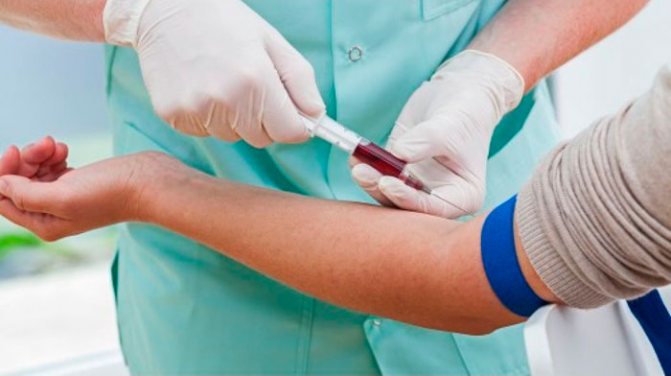
If the patient complains that he is suffering from liquid diarrhea like water, and does not know what to do, he should undergo an in-depth examination. To identify intestinal pathologies it is necessary:
- Take a blood test.
- Make a coprogram.
- Test feces for worm eggs or scrape for enterobiasis.
- Submit the material for bacterial sowing.
- Perform an ultrasound of the abdominal cavity.
Since abdominal pain and loose stools can be a sign of cancer, it is better not to put off visiting a doctor until too late. In the presence of watery diarrhea caused by food poisoning, rotavirus infection, or poor diet, patients are prescribed treatment at home, but under the supervision of a physician.
When urgent medical attention is needed
It is not always safe to treat diarrhea yourself at home. To maintain health, it is very important to immediately seek emergency medical help if the following factors are additionally detected during water diarrhea:
- Fever and sudden increase in body temperature;
- Diarrhea cannot be stopped for more than 3 days;
- Painful sensations intensify;
- The stool that is passed contains blood, mucus, or pus.
It is important to urgently call an ambulance if diarrhea is accompanied by vomiting, which not only does not bring relief, but also occurs frequently.
If such a delicate problem as water diarrhea occurs in an adult, treatment at home is possible. But since this factor is a consequence of serious disturbances in the functioning of the body, in order to make an accurate diagnosis and successful treatment it is necessary to consult a doctor.
source: OPonos.ru
Consequences

It is imperative to treat pathologies that cause watery stools under the supervision of a doctor. Incorrectly constructed treatment can lead to complications such as dehydration, loss of consciousness, abnormal heart rhythm and other problems, including death.
It is urgently recommended to call a doctor if:
- There is a lot of mucus in the stool, and there is even a small amount of blood.
- The patient's condition is rapidly deteriorating; he complains of severe pain and dizziness.
- An adult has had diarrhea with water for 3 days.
- The patient's temperature rises to 38ºC or higher.
Not everyone knows how dangerous diarrhea is. The most severe complications are dehydration, septic shock, hypovolemic shock, acidosis.
Treatment
When diarrhea appears, not everyone knows what to do to normalize their condition in a short time.
To improve stool, complex treatment is indicated:
- Normalization of nutrition.
- Use of medications.
- Maintaining hygiene.
- Treatment with folk remedies.
Medications
With frequent bowel movements, it is important to stop fluid loss and restore normal water-salt balance. To do this you need to take:
- Sorbents: Enterosgel, Smectu, Polysorb, Atoxil, Activated carbon.
- Means for restoring rehydration: Regidron, Electrolyte, Oralit.
- Fixing drugs: Loperamide, Imodium, Furazolidone.
- Means for improving microflora: Laktomun, Acipol, Bifidumbacterin.
During treatment, it is important to maintain a drinking regime. You need to drink at least 2.5 liters of liquid per day. This can be plain water, dried fruit compote, tea, rosehip decoction, broth.
If these methods are ineffective, then after consulting a doctor the following may be added:
- Antibiotics: Levomycetin, Tetracycline.
- Antimicrobial drugs: Furazolidone, Sulgin.
- Motility products: Motilium, Imodium.
- Antispasmodics: No-shpa, Papaverine.
- For bloating: Espumisan.
ethnoscience
When treating at home, the following recipes will help stop diarrhea:
- Drink made from pomegranate peels. Dry peels are poured with water and boiled for 10-15 minutes. Drink 2 tbsp of medicine. l. 1 time per hour.
- Decoction of onion peels. A handful of cleanings is poured into 1 liter of liquid. Cook them for about 10-15 minutes. You need to drink 400 ml of the product per day.
- Carrot puree. The root vegetable is boiled and crushed. Take up to 4 times a day, 3-4 tbsp.
Diet
To stop diarrhea, it is important to normalize the functioning of the gastrointestinal tract, so during the treatment period you need to follow a special diet.
It is worth excluding products that cause allergic reactions, mechanical damage to the mucous membranes or chemical reactions in the digestive tract.
- Alcohol.
- Carbonated drinks.
- Spices.
- Sauces.
- All spicy and fatty dishes.
- Sour fruits, berries.
- Cabbage.
- Cereals.
- Confectionery.
- I'll bake it.
- Chocolate.
- Legumes.
It is useful to diversify your diet with the following foods:
- Boiled and stewed vegetables.
- Lean meat.
- Dairy products.
- Dried bread.
- Rice water.
- Porridge without milk, especially buckwheat and rice.
It is best to steam food, but you can also boil it. You should eat food in small portions 5-6 times a day. You should drink often, but in small sips. A large volume of liquid at one time can cause vomiting.
Prevention
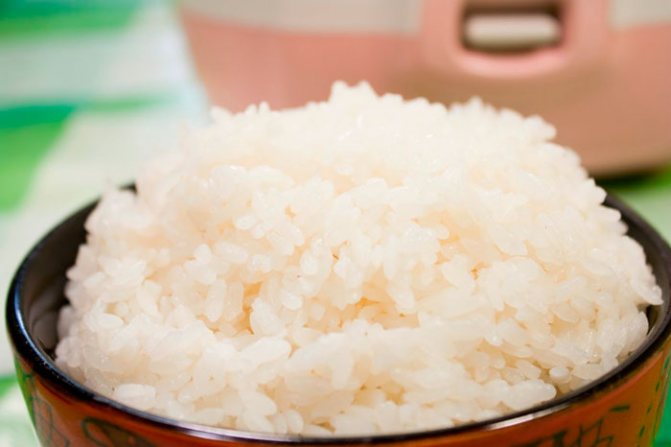
The basis for preventing diarrhea is proper nutrition. To prevent intestinal discomfort from developing into watery diarrhea, you should eat the following dishes:
- Low-fat chicken broth.
- Rice porridge.
- Baked carrots, apples, pears.
- Dry bread, dried out white bread.
A low-carb diet is extremely important for people suffering from chronic diarrhea. Such patients should avoid fatty and heavy foods. You should also drink large amounts of water during diarrhea, dividing your fluid intake into small portions.
For prevention, not only nutrition is important for diarrhea. To prevent water diarrhea from bothering you, you need to carefully monitor your personal hygiene, eat fresh food and remember to undergo regular medical examinations to identify hidden diseases.
Interruptions in the functioning of the intestines cause inconvenience (stomach pain, nausea), destroy a person’s plans, and cause terrible harm to the body. The symptom catches a person, be it an adult or a child, at the wrong moment: while traveling, visiting, at a lecture. Water diarrhea in humans is a common type of unwanted pathology. For proper treatment, eliminate the cause of the painful condition. It is required to clearly understand what caused a serious threat of dehydration. Start treatment immediately.
Is it possible to drink mineral water if you have diarrhea?
It is mineral water that is in second place after rehydrating pharmaceutical solutions, due to its composition. If you have diarrhea, you can drink it in non-carbonated form, which contains microelements such as magnesium, potassium and sodium. Due to its composition, it has the best effect on the body affected by diarrhea, since:
- Thanks to sodium, water-salt metabolism accelerates and becomes more efficient;
- Potassium has good anti-inflammatory properties, thanks to which the condition of the walls and intestinal mucosa is normalized much faster;
- Thanks to the participation of magnesium in enzymatic processes, protein and carbohydrate metabolism improves, and the processes of digestion and absorption of food are normalized.
Drinks containing such a composition of microelements can be drunk with diarrhea of any etiology, without any fear. Only in this case you should follow some general rules. Firstly, to normalize the condition during diarrhea, you need to drink these waters in small portions, but quite often, after each act of defecation. Secondly, if you have diarrhea, you can only drink mineral water heated to 40 degrees, since it is at this temperature that the best absorption of minerals occurs.
The effect of salt water on diarrhea
If, in case of unexpected diarrhea, it is not possible to urgently find liquids that have the required electrolyte composition, they can be replaced with a self-prepared solution. It can also significantly reduce the risk of developing dehydration and help the body replenish fluid reserves. Patients often ask what is the best way to prepare a saline solution that can be drunk during diarrhea to prevent dehydration, and how to use it during severe diarrhea? The simplest and most effective recipe, which has earned many positive reviews, is as follows:
- For a liter of boiled and cooled water to 40 degrees, take half a teaspoon of soda, one salt and a tablespoon of sugar. The prepared solution for diarrhea can be drunk both for the developing treatment of dehydration and for its prevention. For diarrhea, for preventive purposes, a self-prepared solution is consumed in an amount of 200 ml, which should be drunk after each bowel movement. In the case when diarrhea is accompanied by obvious signs of dehydration. The amount of liquid should be increased. It should be 50-100 ml per kilogram of weight. In such quantities, a self-prepared solution should be consumed during the first 10 hours of indigestion, and only after that the dose can be reduced to a prophylactic dose.
Every person, from time to time, due to various circumstances, may have a bowel disorder, and there is always a danger of developing dehydration, especially in small children - that is why you need to know how to properly organize drinking during diarrhea.
Replenishment of lost fluid and electrolytes is of paramount importance in the overall complex of therapeutic measures for this pathological condition.
Watering a patient with loose stools should begin as early as possible, even before the cause of the disease is determined and the treatment prescribed by the doctor is carried out.
Why does body poisoning occur?
The reasons are directly related to non-compliance with hygiene rules. It is caused by improper processing of consumed foods.
Diarrhea can be caused by:
- Not completely purified water;
- eat unwashed tomatoes, cucumbers, apples, pears;
- the diet includes too fatty foods;
- diets and fasting;
- severe stress caused by emotional overstrain;
- combination of incompatible components;
- expired products;
- abuse of foods not accepted by the body.
Pathologies that cause diarrhea:
- infectious disease caused by rotaviruses;
- infectious diseases of the gastrointestinal tract;
- internal bleeding;
- obstruction in the gallbladder;
- lack of vital enzymes;
- Crohn's disease;
- colds;
- chronic diseases;
- metabolic disorders.
A terrible outcome: the cause of the disease can be cholera caused by an intestinal infection.
Vomiting: this is how the brain takes care of us, stupid ones
I remember when I was thirteen, I came across the family saga of the Australian writer Colleen McCullough, “The Thorn Birds,” where, among other bright moments, I remembered how the main character was constantly sick of excitement. I simply sympathized with her terribly, at the same time tormented by the question: why did nature even come up with a way for a person to vomit, is it really impossible to do without this disgusting reaction of the body?
It turns out not. And in fact, vomit needs to be thanked. Vomiting is a mechanism designed by nature that helps us survive by getting rid of everything that the body considers dangerous and inappropriate for itself.
Little depends on us here. The contents of the stomach are thrown back through the esophagus and pharynx into the oral cavity at the command of the vomiting center located in the brain. Look how everything is interconnected: receptors in the peritoneum, kidneys and other organs signal upward that something has gone wrong, and stimulation of the vomiting center causes a reaction familiar to everyone - everything eaten has to be returned in a not the most pleasant way.
There are several types of vomiting, depending on the mechanisms of occurrence.
Central vomiting occurs at the command of the central nervous system. It can be assumed that it was vomiting of central origin that the main character of the book “The Thorn Birds” Maggie Cleary had - in this case, the condition occurs suddenly, has no connection with food intake, but often accompanies unpleasant impressions and experiences.
This is where stress hormones come into play, which are produced in brain cells and in the gastrointestinal tract. And when the head is “stressed,” the digestive tract rushes to the rescue, pushing out food and thereby releasing energy to the body that it would have spent on digesting it.
Also, central vomiting can be associated with increased intracranial pressure, hypertensive crisis, sea and air sickness, migraine, meningitis and brain tumors.
Toxic vomiting is a response to all kinds of poisoning, be it alcohol, nicotine, drugs or any other. By the way, toxicosis, which torments many pregnant women, also falls into this category.
Visceral vomiting indicates dysfunction of internal organs and can serve as a sign of various gastrointestinal diseases: from gastritis and stomach ulcers to pancreatitis, appendicitis and intestinal obstruction. Of course, a diagnosis cannot be made based on this symptom alone.
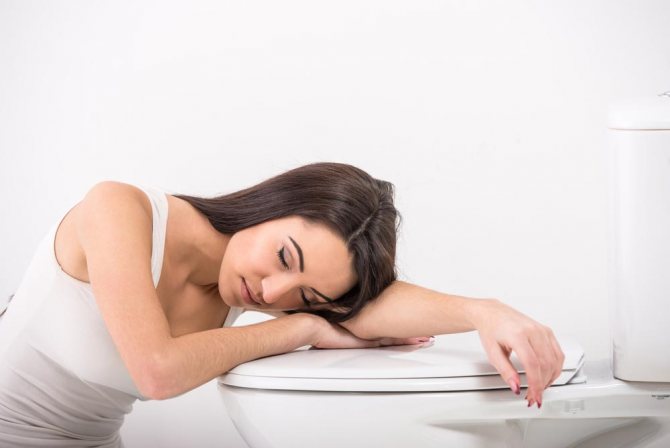
Vomiting is an extremely unpleasant phenomenon, but in some situations our brain can only take care of us in this way. Like a parent slapping a child on the back of the head who sticks his fingers into a socket: harsh, unmodern, anti-pedagogical, but intelligible (I hope the juvenile justice system won’t come to me tomorrow). Well, how could it be otherwise if the “child” doesn’t understand that that eighth glass was clearly superfluous, or it’s not worth being greedy and eating smoked fish forgotten in the refrigerator, which “either spoiled, or it seemed like it, but it’s a pity to throw it away.”
Methods to combat vomiting depend on its origin. It would be strange to suppress vomiting with a sedative if you develop acute peritonitis, right? So start by finding out the cause (if it is not obvious, such as in the case of seasickness). And do not ignore the “voice” of your body, which, through vomiting, tells you about the problems that have arisen in it.
Dangerous clear diarrhea with liquid
The patient's condition is directly related to the cause that caused loose, watery stools. The main thing is to immediately prevent dehydration of the body, which occurs without pain.
There are no visible reasons, nothing hurts. Sometimes the condition may be accompanied by headache, dryness and peeling of the lips.
Signs of the moderate stage: thirst, impaired skin elasticity, anxiety and irritation.
With severe diarrhea, extremely serious conditions are observed: loss of consciousness, rapid pulse, low blood pressure, pale skin. If the disease cannot be treated, a deep state of fainting may occur, and in some cases the death of the patient.
From water, or more precisely, its deficiency in the body, the blood becomes thick, and the likelihood of thrombophlebitis increases.
If your case is too frequent bowel movements, it’s time to take medications that can quickly stop the loss of water from the body and normalize the amount of fluid. Diarrhea is dangerous. For effective treatment, therapy requires:
- Use sorbents that can effectively and quickly eliminate accumulated toxins, formed gases, and bacteria introduced from outside. Activated carbon, Smecta, Enterosgel are effective. Furazolidone and its analogues have a fastening function.
- Take Regidron and drugs that regulate intestinal microflora. They perform a restoration function and enhance the effect of drugs. Bifidumbacterin, acipol, and yogurt are used as regulators.
- Follow a diet.
Drink significant amounts of water. All liquid must be filtered and boiled. The daily norm for an adult is up to two and a half liters.
When to start taking medications? The answer to the question is not so simple. Of course, they do no harm, but the benefit is not obvious if the diarrhea does not stop. Beneficial bacteria and microorganisms simply will not linger in the intestines. The optimal course of treatment should be started after diarrhea stops.
Which one is better to drink?
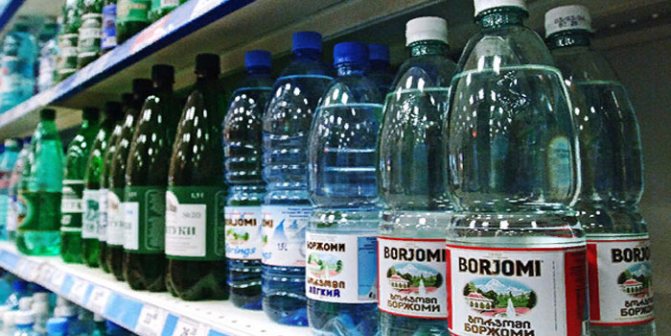
It is important to determine the quantitative indicators of the components found in the mineral drink. If you have diarrhea, you should drink mineral water whose salt content exceeds 2 g/l. This liquid is considered a medicinal liquid and is often used to prevent eating disorders.
If the patient shows signs of intoxication, then the pH balance is restored with mineral water with values from 10 g/l. Although it is better to drink this water with the doctor's permission.
The range of such products is quite extensive. For example, it includes bottled Georgian Borjomi water. It contains magnesium, potassium, boron, silicon, sodium, and chlorine. In addition, Mirgorodskaya, Essentuki, Narzan water is useful.
When purchasing water, you must observe the following nuances:
- It is better to purchase it from a pharmacy chain.
- Study the labeling carefully. The packaging must indicate indications and contraindications, composition, number and depth of the well from which the healing liquid was extracted.
[adsp-pro-3]
It is not necessary to drink mineral water if you have food poisoning. For these purposes, the pharmaceutical preparations Regidron, Regisol Is, Gastrolit, Normohydron, Orsol are used. The powder is diluted in a liter of boiled cool water. An alkaline solution is consumed after each loose bowel movement during the day.
You can prepare a salt drink for adults and children yourself: add 1-2 teaspoons of table salt, the same amount of baking soda and one tablespoon of sugar to a glass of boiled water. The product is thoroughly stirred and taken after each loose bowel movement.
Nutrition for diarrhea
For quality treatment of diarrhea, the patient must monitor his diet and follow a diet for at least three days. If the disease progresses, it is recommended to stop eating. Replace food with strong black sweet tea or still drinking water. The foods that the patient eats immediately after stopping diarrhea should be strengthening: dried bread, boiled fish, non-dairy cereals. You should abstain from dairy products and unprocessed vegetables even after drinking water. Portions are supposed to be small, but frequent, up to six times a day. In this way, it will be possible to stabilize the functioning of the stomach and intestines so that the body does not strain from heavy loads.
On the second day, you are allowed to eat boiled or oven-baked meat. Fruits are introduced into the diet by the sixth day. The fact is that they have a relaxing function and lead to the appearance of gases.
Secretory diarrhea, consequences
Preparations for restoring intestinal microflora
One should not naively believe that such a violation of the mechanism of absorption and excretion of fluid and feces for the body will pass painlessly. If left untreated, the following unpleasant symptoms may develop:
- Dehydration due to massive fluid loss and impaired water metabolism
- Imbalance of electrolytes, trace elements and vitamins
- Hypokalemia – massive loss of potassium in feces
- Acidosis - disturbances in the acid-base balance, decreased pH of the body
- Hyponaremia – removal of sodium from the body due to fluid loss
- Maladsorption – loss of nutrients due to rapid transit through the stomach and intestines
Read: Symptoms of salmonellosis in children, main features
Diarrhea itself is a pathological condition for the body. The consequences of an untreated disease can be worse than the underlying illness. Therefore, do not dismiss seemingly trivial diarrhea with water. This could be a sign of serious health problems. Don't self-medicate! If diarrhea lasts more than a day, you should consult a doctor. This is especially true for pregnant women and children.
Read along with this article:
- Diarrhea with blood in an adult: causes, treatment tactics
- Bloody diarrhea: signs of bleeding, risk factors and treatment measures
- What causes diarrhea in a newborn, what to look for and...
- Diarrhea after every meal, causes and treatment methods
- Remedy for diarrhea in children: how to treat diarrhea
- Is it possible to have diarrhea and constipation at the same time?
- What signs of diarrhea should you especially be wary of?
- Why does a child poop often and how to help him in this case?
- Diarrhea in a one-year-old child: symptoms and dangers
Alternative medicine used for severe diarrhea
Infusions and decoctions containing cumin, sage, blueberries, and chamomile have a therapeutic effect. It is prepared with a mixture of ingredients in proportion to 15:50:30:15 (grams). Throw a tablespoon into 200 ml of boiling water and let it brew for an hour. Strain the broth and squeeze it out. Bring the volume to 1 cup by adding boiled water. Drink the prepared drink four times a day, 100 ml, a quarter of an hour before meals.
A decoction of oak bark, St. John's wort and rowan is useful. The ingredients are combined in a ratio of 3:4:3. A tablespoon of the mixture is poured into 500 ml of boiling water and stirred. It is necessary to wait a while when infusing the decoction. Use four times a day. Since the composition includes St. John's wort, take the solution for no more than two days.
It is recommended to try natural remedies, however, they have contraindications:
- Pomegranate peels. Pomegranate decoction is excellent in combating watery stools. It doesn't take long to prepare. Boil the pomegranate peels over low heat for 10 minutes. Use 2 tablespoons at one-hour intervals daily.
- Onion peel. Pour a handful of husks into a liter of liquid and cook after boiling for 10 minutes. Drink 400 ml in small sips per day.
- Blueberry leaves. Use four tablespoons of leaves per liter of boiling water. Leave for thirty minutes and drink half a glass before meals.
- Vodka and salt. Mix half a teaspoon of salt and 100 grams of vodka. The result is visible after some time. You can repeat the procedure after four hours if the effect is not achieved.
- Carrot puree. Prepare puree from boiled carrots. Eat three spoons four times a day. The chair will become stronger through a number of techniques.
- Ginger. Dry crushed ginger is poured into 200 ml of boiling water. Take a tablespoon of your daily dose every half hour.
Call a doctor immediately! Treating diarrhea at home is dangerous. It is safer to immediately seek medical help if a fever is observed, the temperature rises above 38 degrees, diarrhea does not stop for more than three days, the stomach hurts more severely, and purulent or bloody discharge and mucus are observed in the patient’s stool. Call an ambulance immediately if you feel nauseous and frequent vomiting along with diarrhea.
What can you drink
In addition to saline solutions, if you have diarrhea, you can drink mineral water without gas:
- Narzan.
- Essentuki.
- Borjomi.
It is also recommended to drink a different composition:
- tea;
- decoctions;
- compotes.
During the first 6 or 12 hours from the onset of the disease (the period is determined by the patient’s condition and the degree of dehydration), it is necessary to exclude all food and maintain a fasting pause.
In medicine, this period is called a water-tea break for a reason, because water and tea form the basis of nutrition during this time.
The expansion of the diet in the future will occur gradually as the patient’s condition improves due to:
- rice water;
- porridge with water;
- broth and pureed soup.
Adequate nutrition can be introduced only after the stool and general well-being of the person have normalized.
A decoction of fresh carrots is recommended as one of the effective means of drinking for acute diarrhea in adults and children. The root vegetable needs to be washed, peeled, cut into pieces, boiled, cooled, then squeezed through cheesecloth into the resulting broth, strain and drink in small sips every 5-7 minutes.
You can alternate with a decoction of rose hips and dried fruits (without added sugar). Infusions of berries and cranberry leaves, decoctions of blueberries, bird cherry, and chokeberry are widely used as folk recipes.
Everyone's favorite tea for diarrhea can be drunk in its pure form without flavorings and flavoring additives; the brew should be about twice as strong as usual. People with high blood pressure should be careful. Black tea for diarrhea is preferable to green tea, which itself has a laxative effect.
How does water absorption occur in the intestine?

Every day a person consumes approximately 2 liters of water. It is found not only in drinks, but also in all foods eaten. In addition, liquid enters the lumen of the digestive tract as part of digestive secretions. And about 7 liters are released per day! This includes 1.5 liters of saliva and pancreatic juice, 2.5 liters of gastric juice, half a liter of bile and a liter of intestinal secretions. In total, up to 9 liters of water enter the intestinal lumen daily, and only 100–200 ml (that is, about 2%) of this volume is excreted in the feces. The walls of the small intestine absorb up to 80% of all fluid, and 90% of the remaining amount is absorbed in the large intestine.
In this case, water is absorbed secondarily and passively, following the active transport of electrolytes through the walls of the digestive tract. Sodium ions play the most important role in this process, but potassium and chlorine also take an active part. All these electrolytes enter the intestines with food and digestive juices and are actively absorbed. In this case, the final absorption of water and the absorption of up to 90% of sodium occurs in the large intestine. As a result, fairly dense feces are normally formed here.
Diarrhea is like water without stomach pain
Article on the topic: diarrhea without fever and pain from professionals for people. We invite you to get acquainted with useful information on the topic with our specialists.
Question: Diarrhea without vomiting without fever?
The site provides reference information for informational purposes only. Diagnosis and treatment of diseases must be carried out under the supervision of a specialist. All drugs have contraindications. Consultation with a specialist is required!
34 years. Woman. Three days ago I had a slight nausea in my stomach, the next day I started having diarrhea 4-5 times a day. The stomach pain went away. Now I have diarrhea for three days. I take furazolidone.
After it, the feces take shape, but after some time the diarrhea returns. Appetite is good. No nausea. Yesterday my husband suddenly started having diarrhea. His symptoms are the same as mine: no vomiting, no fever, no pain.
What could have caused this and how to treat it. Thank you!
In this case, these may be signs of food poisoning or rotavirus infection affecting the gastrointestinal tract. It is recommended to consult with a gastroenterologist to conduct a personal examination, examination and prescribe adequate treatment.
It is necessary to adhere to a gentle diet, use enzyme preparations when eating, as well as Enterofuril 200 mg 4 times a day. To replenish lost fluid, drink Regidron solution.
Read more about the causes of diarrhea by clicking on the link: Diarrhea (diarrhea).
after drinking for a day I didn’t drink then my stomach got sick panos no temperature
A similar reaction is possible with pancreatitis. You need to undergo examination and examination by a gastroenterologist to clarify the diagnosis and prescribe adequate treatment. You can read more about the manifestations of this disease in the section of the same name: Pancreatitis.
Causes of diarrhea without fever and vomiting in an adult: the most common factors
Various symptoms can accompany diarrhea in a person. However, diarrhea without fever and vomiting in adults is especially common. And there can be an incredible number of reasons for this condition. But we can distinguish several groups of factors that occur most often. And not all of them go away on their own at home.
Diarrhea is not an independent disease with a clinical picture, but a pronounced symptom of problems in the gastrointestinal tract or the entire body. Interestingly, diarrhea is not always a sign of any physiological disease. Very often the body experiences this condition as a result of stress or emotional overstrain.
Features of digestion
Diarrhea as a symptom is the passage of liquid stool for a certain period of time. It can be either one-time or long-term. Constant or periodic with intensification and attenuation of attacks. It is generally accepted that acute diarrhea lasts 2-3 weeks, and chronic diarrhea lasts a month or longer.
It is normal for the body to excrete 100 to 300 g of feces daily 1-2 times a day. When consuming certain foods that have a cleansing effect, this frequency can be increased.
Stool loosening usually occurs due to a sharp increase in water content in the body and digestive organs. With diarrhea, stool consists of almost 90% liquid. Based on the amount of stool, one can assume the cause of its origin:
- pathologies of peristalsis - daily volume does not increase, but the frequency may change;
- pathologies of absorption by the intestinal wall - the number of bowel movements noticeably increases due to insufficient absorption of food.
However, these are only internal reasons. And diarrhea may not always be hidden behind them. Several other factors lead to diarrhea without fever and vomiting in an adult.
Main causes of diarrhea
Behind such a symptom as diarrhea in combination with mild nausea or without it at all, the following reasons are usually hidden:
- indigestion after overeating or excessive consumption of fatty, high-calorie foods;
- minor food poisoning;
- allergic reaction to certain foods;
- use of medications and specific supplements (antibiotics or sugar substitutes, for example);
- severe stress, fear, fright;
- traveler's diarrhea (change of diet, water, climate).
In most cases, diarrhea goes away within 3-4 days if caused by the factors described above. But it happens that pathology develops against the background of more serious causes.
Important! The most dangerous causes of diarrhea without vomiting and fever are illnesses and infections. These include dysentery, salmonella, and intestinal flu.
In addition to viruses and infections, a similar symptom occurs with diseases of the digestive system - gastritis, ulcers, ulcers, and hepatitis. Functional deficiency due to the lack of certain enzymes also leads to diarrhea, as do diseases of unknown etiology such as Crohn's. Severe poisoning with metals and chemicals is usually accompanied by vomiting, but can only be reflected by diarrhea.
But in any case, acute diarrhea should be stopped first by using Loperamide or other similar medications. Then you need to find out an accurate diagnosis and carry out treatment. In the case of some viruses and diseases, this should only be done in a hospital.
Warning signs
If diarrhea without fever and vomiting is accompanied by a certain group of symptoms, you must call an ambulance. These are the symptoms:
- severe dry skin;
- chapped lips;
- uncontrollable thirst, which cannot be eliminated even by drinking large amounts of water;
- difficulty going to the toilet, problems with urination;
- frequent, very severe and painful diarrhea;
- nausea begins;
- palpitations are felt;
- convulsions or even loss of consciousness appear.
Even one of all these signs is evidence of the development of acute dehydration. When potassium and other nutrients are washed out of the body, the heart malfunctions, leading to coma and heart problems. Even death is possible.
Causes of secretory diarrhea
- Medications.
Taking certain medications can lead to water diarrhea. They increase the osmotic pressure inside the intestine or change the transport of ions in the intestinal wall. Watery diarrhea often occurs when taking laxatives, diuretics, drugs for the treatment of bronchial asthma and thyroid diseases. Drugs with cholinergic effects have a great influence. These include some myasthenic, cardiotonic and antihypertensive drugs, as well as antidepressants and drugs for the treatment of dementia. - Toxins.
Secretory diarrhea can occur against the background of poisoning with mushrooms, arsenic, organophosphorus compounds, insecticides, alcohol and a number of other drugs. - Viral and bacterial infections .
A number of infections cause watery diarrhea due to exposure to the pathogens themselves and their toxins. These are cholera, yersiniosis, some strains of E. coli and staphylococci that produce enterotoxins.
- Hereditary diseases.
There is a congenital secretory pathology (chloridorrhea, sodium diarrhea), the cause of which lies in a mutation in the genes of transport proteins of the intestinal wall. The disease manifests itself in a child from birth. - Hormone-producing tumors.
Some tumors can contribute to the pathological secretion of ions and water in the intestines - medullary thyroid carcinoma, VIPoma, gastrinoma, mastocytoma and others. - Bile salts.
The entry of unadsorbed bile acids and free long-chain fatty acids into the large intestine leads to the secretion of water into the intestinal lumen. The reason for this is impaired absorption of bile acids due to diseases (for example, Crohn's disease) or due to a decrease in the area of absorption. This happens after resection of more than 100 cm of the ileum.
Water diarrhea in an adult: causes and methods of treating pathology
Etiological factors (in other words, the causes of severe diarrhea in an adult) can have different origins. This is for example:
- Infections of bacterial or viral origin affecting the gastrointestinal tract (dysentery, amoebiasis, intestinal flu, salmonellosis, enterovirus).
- Violation of the diet specified by the diet (excess of fried, fatty foods, smoked foods in the diet).
- Acute food poisoning associated with the consumption of products of inadequate quality.
- Intoxication of the body with exogenous substances (alcohol, drugs or medications). Poisoning by vapors of toxic chemicals (lead, mercury, arsenic) is separately distinguished.
- Allergies are the body’s reaction to certain foods (for example, gluten in celiac disease).
- A history of diseases characterized by the production of insufficient amounts of enzymes or impaired functional activity of the liver or pancreas.
- Stress factors. In this case, of course, diarrhea is of neurogenic origin.
“Traveller's diarrhea” is classified as a separate nosological form. Diarrhea with water in such situations is provoked by a sharp change in the usual diet, weather conditions, quality of drinking water, as well as various kinds of emotional outbursts.
In most cases, water diarrhea in an adult occurs in the summer, since the heat promotes the rapid proliferation of flora in the intestines. The likelihood of diarrhea if hygiene standards are not followed, expired foods and poor quality water increases significantly.
Symptoms
Due to disruption of the normal functioning of the gastrointestinal tract, a huge amount of toxic substances accumulates in it. This triggers other symptoms of diarrhea, such as:
- vomiting, nausea;
- flatulence;
- belching under conditions of exacerbation of existing chronic pathologies;
- headache;
- temperature increase.
The presence of symptoms and their severity depend on the severity of the disease. The more severe the condition, the more severe the symptoms will be.
Why is water diarrhea dangerous?
Diarrhea with water is dangerous due to the possibility of developing acute dehydration. Abundant, frequent stools, as well as repeated vomiting, cause the loss of not only fluid, but also a large amount of essential electrolytes.
The human body is 80% water; the loss of even a few percent of it disrupts the normal functioning of all systems and organs.
Lack of fluid primarily affects the functioning of the brain, since this organ is very sensitive to dehydration.
Severe water diarrhea in an adult is dangerous in situations where the patient has diseases that worsen the prognosis or is in a weakened state. Diarrhea is also dangerous for older patients, as their risk of complications increases due to their slow metabolism.
A decrease in water and electrolyte balance is fraught with negative consequences, the worst of which are impaired consciousness, a sharp drop in blood pressure, and tachycardia.
This condition requires immediate medical attention, since further development of hypovolemic shock, cerebral edema, coma with subsequent death is possible.
If there is a temperature
Having a fever with diarrhea is a symptom of a serious illness that requires immediate treatment. Most often, fever appears in the presence of a viral or bacterial infection. The mechanism of its development is based on the fight of immune cells against foreign agents.
Temperatures exceeding 38°C are recommended to be reduced with specialized pharmacological agents. Elevated temperatures, reaching critical numbers for the human body (40-41°C), can cause protein denaturation. The cells of the body “melt”, and this process is irreversible.
What to do
If symptoms of diarrhea occur, treatment should be started immediately. The sooner the necessary therapy is applied, the better the subsequent prognosis.
First aid
First aid is to normalize the water-salt balance. Among the pharmacological agents that alleviate dehydration are:
- Enterol;
- Smecta;
- Activated carbon.
In addition to products purchased at the pharmacy, you can use your home arsenal. Every 2 hours (at the patient’s choice) it is recommended to take:
- rosehip decoction;
- clean water with lemon;
- still water with Regidron or Oralit powders;
- clean water with lemon juice;
- low-fat chicken broth.
Drug treatment
If water diarrhea occurs in an adult, treatment is aimed at:
- removal of toxins from the gastrointestinal tract;
- elimination of gases;
- decreased motility of the large intestine.
Among the medications, the main ones in the treatment of diarrhea in adults are:
- Antibacterial agents in tablet form.
- Antimicrobial agents.
- Enterosorbents used to remove toxic substances.
- Preparations for restoring the balance of electrolytes and fluids.
- Antispasmodics if there is pain.
Water diarrhea in an adult is treated taking into account what exactly caused the symptoms of diarrhea. Therapy is selected individually by the attending physician for each patient separately.
Diet
For effective treatment and speedy recovery, it is necessary to follow a specialized diet. Among the basic principles of nutrition for diarrhea are:
- on the first day of the disease, a minimal food intake and large amounts of fluid are recommended to remove toxic substances;
- you need to start eating low-fat broths, simple one-ingredient dishes;
- food should be warm; cold or hot foods can provoke a gag reflex.
During the acute period of the disease and the first days of rehabilitation, it is necessary to use a gentle diet. Diarrhea with water is the reason for switching to a diet with reduced calorie content, provided that fatty, fried foods are limited.
Folk remedies
To speed up recovery, traditional methods are used in parallel with medications. Dehydration can be reduced and water-electrolyte balance can be normalized by using herbal infusions, namely:
- Pour 15 g of oak bark with a glass of boiling water. Drink 2-3 times a day in an amount of 20 ml until the symptoms of diarrhea completely disappear;
- Pour boiling water over St. John's wort flowers. When the decoction is infused, take a teaspoon 2 times a day;
- Pour hot water over pomegranate peels. Take 10-15 ml 3 times a day.
To normalize the functions of the gastrointestinal tract, you can use decoctions of thyme, nettle, and immortelle. Rice water is considered a good absorbent, promoting the rapid elimination of toxins.
Prevention of diarrhea
It is much easier to prevent a disease than to treat its negative consequences. To avoid diarrhea, it is recommended to adhere to the following rules:
- Careful temperature treatment of products before consumption.
- Timely vaccination against rotavirus infection.
- Vegetables and fruits should be washed with running water or scalded before consumption.
- Avoid drinking water from bodies of questionable quality.
If diarrhea has already appeared, it is necessary to prevent dehydration. To do this, you need to replenish fluid reserves in the body every 30 (if diarrhea) or 15 (if vomiting occurs) minutes.
When to see a doctor
There are situations when home treatment does not give the desired effect. You should immediately seek medical help if:
- the composition of the stool contains particles of rice grains;
- the color and consistency of the discharge changed dramatically for the worse;
- colic and pain increase;
- drowsiness suddenly appeared;
- an increase in vomiting against the background of a general deterioration of the condition.
It is recommended for older people to immediately consult a doctor if symptoms of diarrhea are detected. Patients with concomitant chronic diseases, for example, pathologies of the cardiovascular system, liver or kidneys, also require special attention.
Watery diarrhea in an adult is an important symptom indicating a disruption in the normal functioning of the body. To prevent diarrhea, it is important to maintain good personal hygiene and food culture.
It is necessary to monitor the quality of foods consumed in the diet.
An important aspect of preventing the occurrence of diarrhea is increasing immunity, which will help increase the body's resistance against viral and bacterial agents.
You can share the article with your friends on a social network:
Source: https://proktoinfo.ru/diareya/ponos-vodoj-u-vzroslogo-prichiny-i-sposoby-lecheniya-patoloii
What to do if you have water diarrhea?
Loperamide (the active ingredient of IMODIUM ® Express) binds to opiate receptors in the intestinal wall, suppresses the local production of acetylcholine, calmodulin and prostaglandins. Calcium channels are also blocked, plasma membrane permeability decreases, and intestinal motility activity decreases. As a result, the secretion of water into the intestinal lumen is significantly reduced, and its absorption is enhanced. Therefore, IMODIUM ® Express can be used in the complex treatment of secretory diarrhea (water diarrhea).
«>
